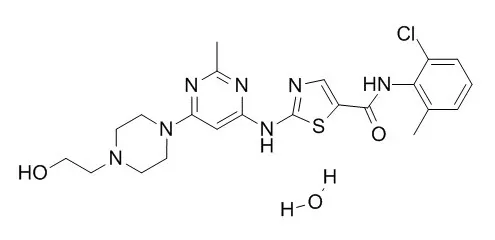| In vitro: |
| Biochem J. 2015 Jan 15;465(2):271-9. | | The clinically approved drugs dasatinib and bosutinib induce anti-inflammatory macrophages by inhibiting the salt-inducible kinases.[Pubmed: 25351958] | We demonstrate that the clinically approved cancer drugs bosutinib and Dasatinib monohydrate induce several hallmark features of 'regulatory'-like macrophages.
METHODS AND RESULTS:
Treatment of macrophages with bosutinib or Dasatinib monohydrate elevates the production of IL-10 while suppressing the production of IL-6, IL-12p40 and tumour necrosis factor α (TNFα) in response to Toll-like receptor (TLR) stimulation. Moreover, macrophages treated with bosutinib or Dasatinib monohydrate express higher levels of markers of 'regulatory'-like macrophages including LIGHT, SPHK1 and arginase 1. Bosutinib and Dasatinib monohydrate were originally developed as inhibitors of the protein tyrosine kinases Bcr-Abl and Src but we show that, surprisingly, the effects of bosutinib and Dasatinib monohydrate on macrophage polarization are the result of the inhibition of the salt-inducible kinases. Consistent with the present finding, bosutinib and Dasatinib monohydrate induce the dephosphorylation of CREB-regulated transcription co-activator 3 (CRTC3) and its nuclear translocation where it induces a cAMP-response-element-binding protein (CREB)-dependent gene transcription programme including that of IL-10. Importantly, these effects of bosutinib and Dasatinib monohydrate on IL-10 gene expression are lost in macrophages expressing a drug-resistant mutant of salt-inducible kinase 2 (SIK2).
CONCLUSIONS:
In conclusion, our study identifies the salt-inducible kinases as major targets of bosutinib and Dasatinib monohydrate that mediate the effects of these drugs on the innate immune system and provides novel mechanistic insights into the anti-inflammatory properties of these drugs. | | Mol Med Rep. 2015 Sep;12(3):3249-56. | | Dasatinib enhances antitumor activity of paclitaxel in ovarian cancer through Src signaling.[Pubmed: 25975261] | The potential effect of Dasatinib monohydrate on ovarian cancer is not clear. The aim of the present study was to investigate the antitumor activity of Dasatinib monohydrate, alone and in combination with paclitaxel, in ovarian cancer in vitro and in vivo.
METHODS AND RESULTS:
In the present study, the expression of Src and phospho‑Src-Y416 (p‑Src) was measured in six ovarian cancer cell lines using western blotting and immunohistochemistry. In addition, cell viability and apoptosis were measured using an MTT assay and annexin V‑fluorescein isothiocyanate staining. An ovarian cancer murine xenograft model was established, in order to evaluate the antitumor effect of Dasatinib monohydrate alone and in combination with paclitaxel in ovarian cancer. High levels of p‑Src protein expression were observed in all cell lines, as compared with healthy cells, which indicated activation of the Src signaling pathway. p‑Src expression increased in ovarian cancer cells following paclitaxel treatment. Dasatinib monohydrate treatment demonstrated anti‑ovarian cancer properties, by downregulating p‑Src expression and by inducing cancer cell apoptosis. Combined treatment with Dasatinib monohydrate and paclitaxel markedly inhibited proliferation and promoted apoptosis of ovarian cancer cells, compared with control cells. Combined Dasatinib monohydrate and paclitaxel treatment exhibited antitumor activities in vivo and in vitro (combination indices, 0.25‑0.93 and 0.31‑0.75; and tumor growth inhibitory rates, 76.7% and 58.5%, in A2780 and HO8910 cell lines, respectively), compared with paclitaxel treatment alone.
CONCLUSIONS:
Dasatinib monohydrate monotherapy demonstrated anti‑ovarian cancer activities. The effects of Dasatinib monohydrate and paclitaxel treatments on ovarian cancer cells appeared to be mediated by the Src pathway. |
|






 Cell. 2018 Jan 11;172(1-2):249-261.e12. doi: 10.1016/j.cell.2017.12.019.IF=36.216(2019)
Cell. 2018 Jan 11;172(1-2):249-261.e12. doi: 10.1016/j.cell.2017.12.019.IF=36.216(2019) Cell Metab. 2020 Mar 3;31(3):534-548.e5. doi: 10.1016/j.cmet.2020.01.002.IF=22.415(2019)
Cell Metab. 2020 Mar 3;31(3):534-548.e5. doi: 10.1016/j.cmet.2020.01.002.IF=22.415(2019) Mol Cell. 2017 Nov 16;68(4):673-685.e6. doi: 10.1016/j.molcel.2017.10.022.IF=14.548(2019)
Mol Cell. 2017 Nov 16;68(4):673-685.e6. doi: 10.1016/j.molcel.2017.10.022.IF=14.548(2019)